

Shifting to 21st Century Thinking » A Change Theory: Key Concepts for Understanding the Work of Robert Kegan. General Rationale and Approach In over our heads: Robert Kegan believes that the constantly changing demands of modern life may be developmentally inappropriate for many—perhaps even most—adults.
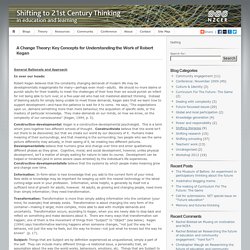
We should no more blame or punish adults for their inability to meet the challenges of their lives than we would punish an infant for not being able to turn over, or a five-year-old who had not mastered abstract thinking. Instead of blaming adults for simply being unable to meet these demands, Kegan asks that we learn how to support development—and have the patience to wait for it to come. He says, “The expectations upon us…demand something more than mere behaviour, the acquisition of specific skills, or the mastery of particular knowledge.
Glossary Definition: Postmodernism. A general and wide-ranging term which is applied to literature, art, philosophy, architecture, fiction, and cultural and literary criticism, among others.
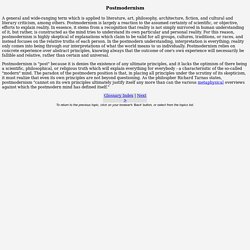
Postmodernism is largely a reaction to the assumed certainty of scientific, or objective, efforts to explain reality. In essence, it stems from a recognition that reality is not simply mirrored in human understanding of it, but rather, is constructed as the mind tries to understand its own particular and personal reality. For this reason, postmodernism is highly skeptical of explanations which claim to be valid for all groups, cultures, traditions, or races, and instead focuses on the relative truths of each person. In the postmodern understanding, interpretation is everything; reality only comes into being through our interpretations of what the world means to us individually. World view. Origins[edit] Linguistics[edit] The founder of the idea that language and worldview are inextricable is the Prussian philologist, Wilhelm von Humboldt (1767–1835).
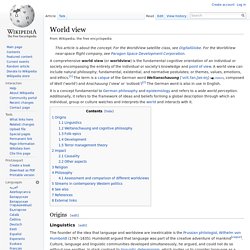
Humboldt argued that language was part of the creative adventure of mankind[vague]. Culture, language and linguistic communities developed simultaneously, he argued, and could not do so without one another. In stark contrast to linguistic determinism, which invites us to consider language as a constraint, a framework or a prison house, Humboldt maintained that speech is inherently and implicitly creative. Edward Sapir also gives an account of the relationship between thinking and speaking in English. Developmental Platforms. Vertical Development. Leadership and Complexity-of-Mind. Leading in Complexity: Implications for Coaching. Habits of mind and heart that support us to learn and grow. Habits of Mind. Asking Different Questions: The First Transformational Habit of Mind.
My hunch is that many people who frequent this website are familiar with the distinction between a technical change a leader might want to make in herself or her team, and an adaptive change.
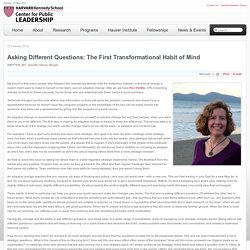
After all, we have Ron Heifetz, CPL's founding director, to thank for these concepts; but for those who are unfamiliar with them, here's a quick summary. Technical changes are the ones where new information or tools will solve the problem: someone who doesn't use a spreadsheet because he doesn't have the computer program or the knowledge of the tool can be easily turned into someone who does use a spreadsheet by giving him the program or a quick course.
An adaptive change is required when you want people (or yourself) to actually change the way they behave, when you want them to act or be different. The first step in making an adaptive change is simply to know the difference. For example, I have a client who wishes she were more strategic. How do you develop this habit?
Fostering Post-Conventional Thinking. Guide to adaptive challenges and action learning. Key Concepts in Adult Development. Jennifer Garvey Berger, Cultivating Leadership - Part 1. Jennifer Garvey Berger, Cultivating Leadership - Part 2. Jennifer Garvey Berger, Cultivating Leadership - Part 3. Jennifer Garvey Berger, Cultivating Leadership - Part 4. Jennifer Garvey Berger, Cultivating Leadership - Part 5. Shifting thinking workshop: Our world is more complex. Generative Conversations. The Power of Integrative Thinking : ChangeWise. In her classic book, The Change Masters, Rosabeth Kanter found that the key difference between truly innovative change leaders and those who focused only on incremental change lay came down to two different mindsets.
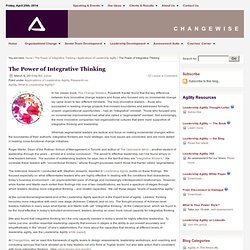
The truly innovative leaders – those who succeeded in leading change projects that crossed boundaries and addressed formerly unseen organizational opportunities – had an “integrative” mindset. Those who focused only on incremental improvements had what she called a “segmentalist” mindset. Not surprisingly, the more innovative companies had organizational cultures that were more supportive of integrative thinking and leadership. Whereas segmentalist leaders are tactical and focus on making incremental changes within the boundaries of their authority, integrative thinkers are more strategic, see how issues are connected, and are more skilled in leading cross-functional change initiatives.
The Importance of Leadership Agility.wmv. Assessing Leadership Potential Using Constructive-Developmental Theory. Servant Leadership and Constructive Development Theory. Personality & Leadership Developmental Levels as Predictors of Leader Performance. The use of constructive-developmental theory to advance the understanding of leadership. Developmental Networks at Work for Leader Development. EXAMINATION OF EXECUTIVE LEADERSHIP EFFECTIVENESS USING CONSTRUCTIVE DEVELOPMENTAL THEORY. DEVELOPMENTAL APPROACH TO GLOBAL LEADERSHIP.
Viewcontent. Three key ingredients to learning from failure. As we’ve been supporting our clients—and ourselves—to become more agile in the face of complexity, one key breakpoint has emerged: when you try new things, failure is always an option.
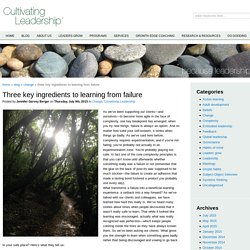
And no matter how solid your self-esteem, it stinks when things go badly. As we’ve said here before, complexity requires experimentation, and if you’re not failing, you’re probably not actually in an experimentation zone. You’re probably playing too safe. In fact one of the core complexity principles is that you can’t know until afterwards whether something really was a failure or not (remember that the glue on the back of post-its was supposed to be much stickier—the failure to create an adhesive that made a lasting bond fostered a product you probably use every day). What transforms a failure into a beneficial learning experience, a setback into a way forward? Time: Ok, so this one isn’t a secret. Shifting to 21st Century Thinking » A Change Theory: Key Concepts for Understanding the Work of Robert Kegan.
A summary of the Constructive-Developmental Theory Of Robert Kegan. How Do You Know ? The Further Reaches of Adult Development - Robert Kegan. Robert Kegan. Robert Kegan (born 24 August 1946) is an American developmental psychologist and author.
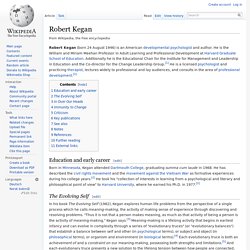
He is the William and Miriam Meehan Professor in Adult Learning and Professional Development at Harvard Graduate School of Education. Additionally he is the Educational Chair for the Institute for Management and Leadership in Education and the Co-director for the Change Leadership Group.[1] He is a licensed psychologist and practicing therapist, lectures widely to professional and lay audiences, and consults in the area of professional development.[2] Education and early career[edit] The Evolving Self[edit] In his book The Evolving Self (1982), Kegan explores human life problems from the perspective of a single process which he calls meaning-making, the activity of making sense of experience through discovering and resolving problems.
The final chapter of The Evolving Self, titled "Natural Therapy," is a meditation on the philosophical and ethical fundamentals of the helping professions. An Overview of Constructive Developmental Theory (CDT) A generation ago, developmental psychologists focused on infants, children and adolescents because it was assumed that by the time we reached our early twenties, the mind was fully developed.
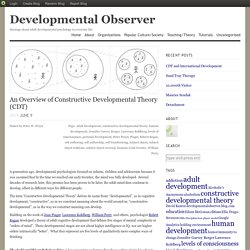
Several decades of research later, this premise has been proven to be false; the adult mind does continue to develop, albeit in different ways for different people. The term “Constructive-Developmental Theory” derives its name from: “developmental”, as in cognitive development; “constructive”, as in we construct meaning about the world around us; “constructive-developmental”, as in the way we construct meaning can develop. Building on the work of Jean Piaget, Lawrence Kohlberg, William Perry, and others, psychologist Robert Kegan developed a theory of adult cognitive development that defines five stages of mental complexity or “orders of mind”. These developmental stages are not about higher intelligence or IQ, nor are higher orders intrinsically “better”. Integrating Concepts of Robert Kegan's Subject-Object theory; Buddhist psychology; Systems theory; & Schon's Reflective Practitioner Model.
My thinking has been highly influenced by the work of Harvard educator, Robert Kegan.
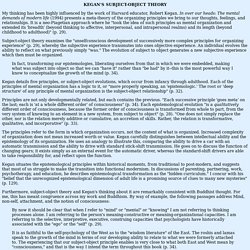
In over our heads: The mental demands of modern life (1994) presents a meta-theory of the organizing principles we bring to our thoughts, feelings, and relationships. It is a neo-Piagetian approach where he "took the idea of such principles as mental organization and extended its 'breadth' (beyond thinking to affective, interpersonal, and intrapersonal realms) and its length (beyond childhood to adulthood)" (p. 29). Subject-object theory examines the "unselfconscious development of successively more complex principles for organizing experience" (p. 29), whereby the subjective experience transmutes into ones objective experience.
An individual evolves the ability to reflect on what previously simply "was. " The evolution of subject to object generates a new subjective experience which then must be organized. Principles are not only developmentally related, but each contains the previous. Definitions. Nine Action Logics of Adult Development. Seven Transformations of Leadership.
Every company needs transformational leaders—those who spearhead changes that elevate profitability, expand market share, and change the rules of the game in their industry.
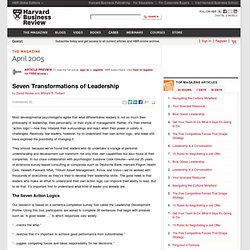
But few executives understand the unique strengths needed to become such a leader. Result? They miss the opportunity to develop those strengths. Seven Stages of Transformative Worldviews. Jack Mezirow and Transformational Learning Theory. Jack Mezirow Transformational Learning by Sunny Cooper, M.S., M.Ed. Mezirow Transformative Learning. Transformational Learning Goal: Change the Frame of Reference. Mezirow's Ten Phases of Transformative Learning - Transformative Learning. The Transformative Learning Theory was first articulated by Jack Mezirow of Columbia University after researching factors related to the success, or lack of, of womens’ reentry to community college programs in the 1970's, with the resulting conclusion that a key factor was perspective transformation . He went on to describe a 10 phase transformation process which emerged as common to many of the women who successfully re-entered community college.
Transformational leadership. Transformational leadership enhances the motivation, morale, and performance of followers through a variety of mechanisms. These include connecting the follower's sense of identity and self to the project and the collective identity of the organization; being a role model for followers that inspires them and makes them interested; challenging followers to take greater ownership for their work, and understanding the strengths and weaknesses of followers, so the leader can align followers with tasks that enhance their performance.
TRANSFORMATIVE LEARNING THEORY. Folks: Transformational Learning Theory. Transformative learning. TRANSFORMATIVE LEARNING THEORY. Daniel Dennett on Tools To Transform Our Thinking - YouTube.